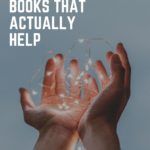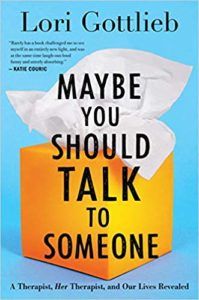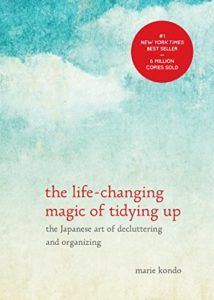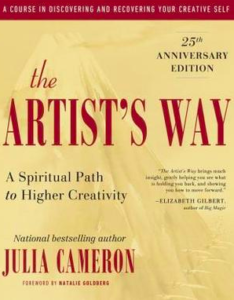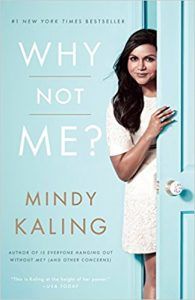Certain books are like a hit of caffeine to our world-weary souls. Finding a book that helps create lifelong habits is admittedly much harder. So many self-help books out there are like a pep talk from your best friend. You feel great for a while, maybe even long enough to take action on something, but eventually you find yourself once again staring down Suzanne Sommers at Barnes & Noble. I can’t speak universally, but I do know that the following books have greatly altered my life for the better in specific and long-lasting ways.
Maybe You Should Talk to Someone by Lori Gottlieb
Therapist Lori Gottlieb steps down from the intellectual pedestal I assume all therapists inhabit, and speaks frankly to her audience. Gottlieb explores both her experiences with her clients, and her experiences on the other side of the metaphorical legal pad when a bad breakup forces her to confront her own fear of death. This book contains such levity and such gravity, such joy and such pain, such compassion and such denial. I laughed out loud several times. Often, I had to put the book down because I was crying too hard to keep reading. With wisdom, heart, humor, and trust, Gottlieb painstakingly shows that humanity, happiness, and courage can be found everywhere. Even if we don’t want to look at it, or see it within ourselves. Check this one out if: you’re considering therapy, have been to therapy, or are afraid to get to know yourself better.
The Life-Changing Magic of Tidying Up by Marie Kondo
Speaking only from personal experience, this book actually did change my life. When I moved from a 1400 square foot townhouse in Atlanta to a 380 square foot cabin in the Colorado wilderness, change was necessary. Before this book, I regularly examined my closet and made donation trips to the local thrift store, but this time something more drastic was in order. This book helped me fit comfortably into my cabin, but more importantly, it completely changed my relationship to my possessions. I no longer feel the urge to spend money on useless junk. Instead, I think, “where will I put this?” I have more more respect for the things I own. I’m more likely to repair my things, and I’m less likely to break them in the first place because I have a more conscious mindset. It’s saved me money, it’s eco-friendly, and I don’t feel choked by junk everywhere. A special kind of pride comes with taking care of your surroundings. Many have criticized Kondo’s methods, but I happily took the advice that worked for me and discarded the recommendations that seemed impractical (lol I will NOT be cleaning out my purse and repacking it every day). Check this one out if: you’re tired of tripping over your crap all the time.
The Artist’s Way by Julia Cameron
Julia Cameron has turned me into a monster. I evangelize about this book at every possibility. It has been shoehorned into every conversation I could possibly shoehorn it into. First I listened to the audiobook, looking for a hit of soul-caffeine. I was so struck by its principles that I immediately purchased a physical copy and got down to studying it like a textbook. Seriously, with highlighters and a notebook and everything. I did not realize how deeply I had internalized the message that creativity is frivolous and all pleasure is hedonism until I read this book. You don’t need to want to be the next Martin Scorcese (who Julia Cameron married) to get something out of this book. If you struggle with self-expression or feeling like your life is one-dimensional, I recommend you pick up this book. Unlike similar manifestos about creativity, Cameron provides specific, concrete, and far-reaching exercises. She forces you to examine your own preconceived notions about talent, joy, and your inherent value. A word of advice before you tackle this book: the more you think an exercise won’t help you, the more you need to do it. I don’t make the rules. I just sullenly and begrudgingly allow Julia Cameron to tell me about myself. Check this one out if: you’re yearning to unlock your inner creative.
The F*ck It Diet by Caroline Dooner
According to the National Association of Anorexia Nervosa and Associated Disorders, about 10% of people in the U.S. suffer from an eating disorder. A survey conducted by Science Daily in 2008 showed additional 65% of women suffer from disordered eating. Approximately 16% of trans people suffer from an eating disorder. You may have heard of the Intuitive Eating movement already (also called Health at Every Size). The F*ck It Diet is the plain-spoken, scientifically backed guide to breaking disordered eating patterns. Dooner wields in-depth research and personal experience to coach other people off of the shame-inducing hamster wheel of dieting. She offers practical advice to disentangle the notion that fat = unhealthy/morally bad and skinny = good/morally just. Check this one out if: you suspect life has more to offer than counting carbs.
Why Not Me? by Mindy Kaling
This one’s for the weirdos. The people who love McDonald’s despite lectures from the Vegan Yoga Goddesses (see: The F*ck It Diet). Who dive in unselfconsciously to niche and uncool passions. Who see all of the barriers to what they want and think, “why not me?” Written in Kaling’s trademark tongue-in-cheek tabloid style, this memoir sneaks up on you. As easy to gobble up as a salacious rag, Kaling’s message has continued to echo in my head in the 2 years since I read this book. Battling a parade of people telling her she didn’t belong, would never belong, Kaling’s voice and vision stayed strong. She managed to use that voice in the creation of some of the most culturally important entertainment projects of our era. She shattered the white, male, stick-figure Hollywood glass ceiling without any of us really noticing, until she had already won us over. Check this one out if: a little part of you has ever wondered, “why not me?”
